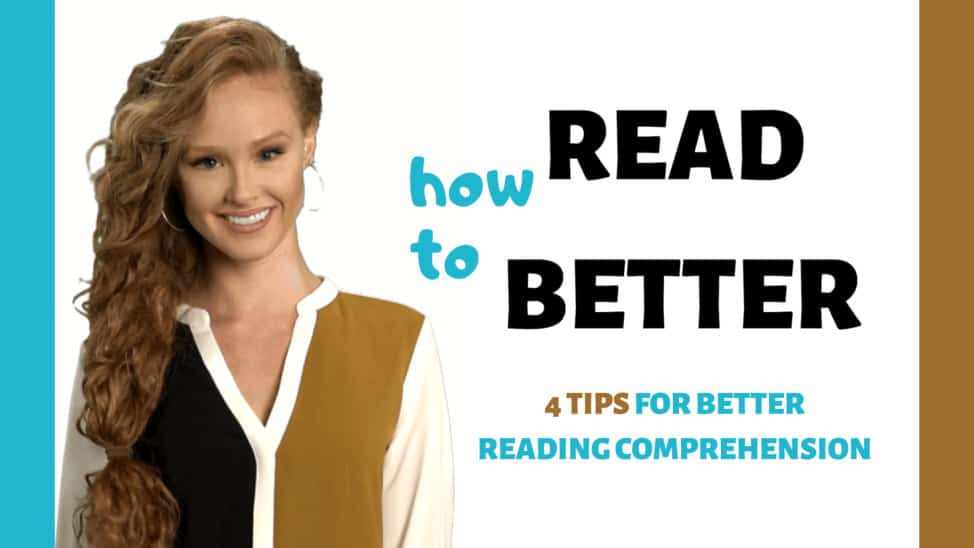By Katie Azevedo, M.Ed.
To teach you how to read better, I could simply list out 10 proven reading comprehension strategies that will help you read and understand complicated material.
But that’s not what this post is about. Sorry if that’s what you were expecting! (Okay, okay: Here’s the best reading strategy ever).
Instead, I’m going to give you four tips for how to read better … but the tips don’t actually have anything to do with reading. Whaaat.
The following four reading comprehension tips are very important factors that we have complete control over. Yet we often neglect to think about them when we sit down to read a book (before you read anything, be sure to read these tips here), begin a study session, work on a project, or do anything that requires us to actually think.
4 tips for how to read better (or do anything better!)
1. Pick the right time of day.
We are all hardwired and/or conditioned to be more alert at a particular time of day. This is called our chronotype (biological clock). So be sure to align your reading or study sessions with your natural energy levels, or chronotype. Here’s the science behind chronotypes, if you want. Personally, I can’t even do simple tasks at 10:00 pm (I’ve actually brushed my teeth with face lotion because I was too tired to pay attention to what I was doing), so I certainly wouldn’t sit down to do something mentally challenging at that hour. But 5:00 am? I’m on it!
Know yourself. Know what time of day you’re more alert, and do your most difficult work then. If you’re a sphere, don’t try to fit yourself into a square hole if you know what I mean.
2. Be aware of your stress level.
If you’ve had a particularly bad day, or you’ve just been feeling stressed out in general, you’re absolutely going to struggle with reading comprehension. Your brain can only be in one place at a time.And if you’re worried about your friend being mad at you or about your upcoming project due date, you’re going to have no mental energy to put towards processing what you’re reading. So if you’ve got a lot on your mind, see if you can resolve those issues before you sit down to do your work.
If you really can’t solve the issues before you have to get your work done, at least come up with and write down a game plan for addressing those issues at a later date. You’ll be better able to read and comprehend if you know how and when you plan to deal with the stuff that’s stressing you out.
3. Anticipate the duration of the work.
Before you begin working or reading, get a sense of the size of the task and how long you think it’s going to take to complete. If you’re a slow reader and you have 3 chapters to get through, you’ll need a good chunk of time. But if you’re a quick reader with only have 10 pages to read, you won’t likely need much time. If you have an open-ended task such as studying for a test, set a specific duration that you want to work for. The point is, it’s important (mentally) that we have a sense of how long we will be working before we begin so that we mentally prepare for the task.
Think of it this way: Before you sit down to watch a movie, you usually check to see how long it is, right? Or before you go for a run, you generally know how long or far you plan to go, yes? Having an end-time in sight can make your reading session go quicker because you’re not constantly wondering when is this going to end?!
4. Know your attitude towards the task, and adjust it if needed.
I get it: not every book makes us want to hug it. Not every task makes us feel like unicorns and sprinkles. But when we feel negative about what we are about to do — whether reading a book, studying, writing, etc. — the task instantly becomes harder. Want to know how to read better? Figure out how to not hate what you’re reading! This is totally possible if you consciously make an effort to find some kind of connection to the book, some purpose that you can hold on to as you read it.
If all you’re thinking is I hate this book and my teacher is making me read it, you’re going to struggle through it. Instead, shift your attitude and thoughts towards something positive. Some strategies for doing this include watching videos on the topic beforehand so you understand the story, doing a Google search for the topic before you read so you get a gist of the material, and even something silly like ramping up your enthusiasm for the book by getting new colored pens for your annotations. Seriously, whatever works, do it!
So while none of these 4 tips for how to read better will actually change the complexity of your material or your literacy level, they most certainly are controllable factors that will affect your reading experience, and thus your reading comprehension. You’re going to have a much easier time understanding what you read if you’re alert, you’re not stressed, you anticipate the duration of the activity and you don’t hate what you’re doing.

